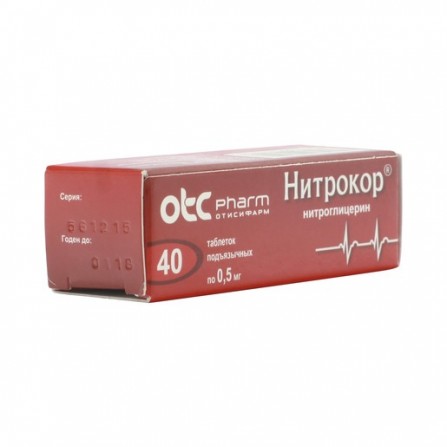Nitrocor pills sublingual 40 pcs
Condition: New product
1000 Items
Rating:
Be the first to write a review!

More info
Active ingredients
Nitroglycerine
Release form
Pills
Composition
1 tablet or capsule contains nitroglycerin 0.0005 g, in a polystyrene tube 40 pills, in a carton pack 1 tube or in a blister pack of 20 capsules, in a carton pack 2 packs.
Pharmacological effect
Peripheral vasodilator with a predominant effect on the venous vessels. Antianginal agent. The mechanism of action is associated with the release of the active substance nitric oxide in the smooth muscles of the blood vessels. Nitric oxide causes the activation of guanylate cyclase and increases the level of cGMP, which ultimately leads to relaxation of smooth muscle. Under the influence of glyceryl trinitrate, arterioles and precapillary sphincters relax to a lesser extent than large arteries and veins. This is partly due to reflex reactions, as well as the less intense formation of nitric oxide from the molecules of the active substance in the walls of arterioles. The action of nitroglycerin (glyceryl trinitrate) is associated mainly with a decrease in myocardial oxygen demand due to a decrease in preload (dilation of peripheral veins and a decrease in blood flow to the right atrium) and an afterload (decrease in OPS). Promotes the redistribution of coronary blood flow in the ischemic subendocardial areas of the myocardium. Increases tolerance to physical exertion in patients with coronary artery disease, angina. In heart failure, it promotes myocardial discharge, mainly due to a decrease in preload. Reduces pressure in the pulmonary circulation.
Pharmacokinetics
After ingestion is absorbed from the gastrointestinal tract, is the effect of the first passage through the liver. With sublingual use, this effect is absent, and the therapeutic concentration in the blood plasma is reached within a few minutes. Metabolized in the liver with the participation of nitrate reductase. Of the nitroglycerin metabolites, dinitro derivatives can cause pronounced vasodilation; it is possible that they determine the therapeutic effect of nitroglycerin (glyceryl trinitrate) when taken orally. Plasma protein binding is 60%. T1 / 2 after ingestion - 4 hours, with sublingual use - 20 minutes, after intravenous administration - 1-4 minutes. Excreted mainly by the kidneys.
Indications
Angina pectoris
Contraindications
Glaucoma, cranial hypertension, impaired cerebral circulation, marked cerebral atherosclerosis.
Precautionary measures
Since the cardiovascular system: dizziness, headache, tachycardia, skin hyperemia, fever, arterial hypotension; rarely (especially in overdose) - collapse, cyanosis. On the part of the digestive system: nausea, vomiting. From the side of the central nervous system: rarely (especially in case of overdose) - anxiety, psychotic reactions.
Use during pregnancy and lactation
The use of nitroglycerin (glyceryl trinitrate) during pregnancy and lactation (breastfeeding) is possible only in cases where the intended benefits to the mother outweigh the potential risk to the fetus or infant.
Dosage and administration
Nitrocor is used sublingually (in a sitting position) - 1-2 drops are applied under the tongue or applied to a small piece of sugar, which is placed under the tongue, without swallowing, until complete resorption. The interval between re-use should be at least 30 s, if necessary, to relieve angina attacks - 5 min (while maintaining pain after taking 3 doses for 15 min, hospitalization is necessary). For the prevention of 1 drop for 5-10 minutes before the expected load or stress. The maximum single dose of Nitrocor - 4 drops, daily - 16 drops.
Side effects
Tinnitus, headache, dizziness, hypotension, tachycardia.
Interaction with other drugs
With simultaneous use with vasodilators, ACE inhibitors, calcium channel blockers, beta-blockers, diuretics, tricyclic antidepressants, MAO inhibitors, ethanol, ethanol-containing drugs may increase the hypotensive effect of glyceryl trinitrate. With simultaneous use with beta-blockers, calcium channel blockers increases antianginal action. With simultaneous use with sympathomimetics, the antianginal effect of glyceryl trinitrate may be reduced, which, in turn, may reduce the pressor effect of sympathomimetics (as a result, arterial hypotension is possible). With the simultaneous use of agents with anticholinergic activity (includingtricyclic antidepressants, disopyramide) develops hyposalivation, dry mouth. There is limited evidence that acetylsalicylic acid, used as an analgesic, increases the concentration of nitroglycerin (glyceryl trinitrate) in blood plasma. This may be accompanied by increased hypotensive effect and headaches. In a number of studies, a reduction in the vasodilating effect of nitroglycerin (glyceryl trinitrate) was observed during long-term therapy with acetylsalicylic acid. It is believed that it is possible to enhance the antiplatelet effect of acetylsalicylic acid on the background of the use of nitroglycerin (glyceryl trinitrate). With simultaneous use of nitroglycerin decreases the effect of acetylcholine, histamine, norepinephrine. On the background of intravenous injection of nitroglycerin, a decrease in the anticoagulant effect of heparin is possible. With simultaneous use, it is possible to increase the bioavailability of dihydroergotamine and reduce the antianginal effect of nitroglycerin (glyceryl trinitrate). With simultaneous use with procainamide may increase the hypotensive effect and the development of collapse. With simultaneous use with rizatriptan, sumatriptan increases the risk of developing spasm of the coronary arteries; with sildenafil - the risk of severe arterial hypotension and myocardial infarction; with quinidine - orthostatic collapse is possible; with ethanol - severe weakness and dizziness.
special instructions
It is used with caution in patients with severe cerebral atherosclerosis, impaired cerebral circulation, with a tendency to orthostatic hypotension, with severe anemia, in elderly patients, as well as with hypovolemia and marked impaired liver function (parenteral). With prolonged use may develop tolerance to the action of nitrates. To prevent the occurrence of tolerance, it is recommended to observe a 10-12 hour break in their use during each 24-hour cycle. If the cutaneous use of nitroglycerin (glyceryl trinitrate) causes an attack of angina, it should be stopped by taking glyceryl trinitrate under the tongue. During the period of treatment to prevent the use of alcohol.Impact on the ability to drive vehicles and control mechanisms: Glyceryl trinitrate can reduce the speed of psychomotor reactions, which should be considered when driving vehicles or doing other potentially dangerous activities.




